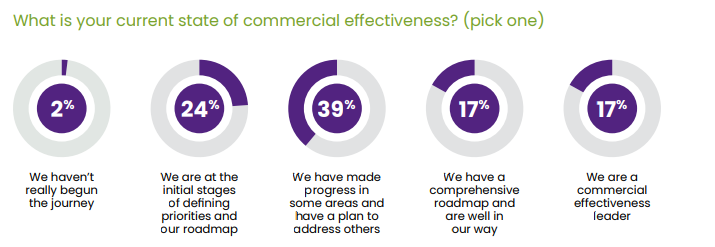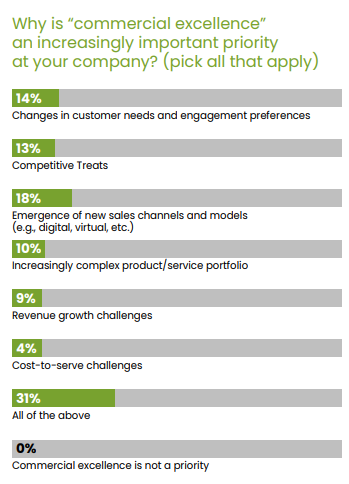Commercial excellence has become an increasingly important priority at many hotel organizations this year. The concept is about alignment across all drivers of top line sales generation. While Europe has been in the forefront of commercial strategy development, 34% of North American HSMAI Organization Members report they are either leading commercial effectiveness or well on their way, while 39% report some progress.
It takes leadership to hold the vision and help each discipline find the mix of skills and strategies that contribute to overall success. Mike Moorman, Principle at ZS, suggested, “There are two ways to get to commercial excellence – evolution or revolution. Evolution is incremental, a year over year continuous improvement plan. Transformational is a larger scale strategy and/or capabilities change.”
One trend that has accelerated this shift has been the need to reduce headcount in leadership, therefore putting all three disciplines under one umbrella was a good business decision. Another has been the continued shift of revenue management leadership in determining sales strategy, while at the same time the traditional marketing team’s approaches have shifted to digital and ecommerce strategies. This, too, has positioned revenue management professionals in a place of influence.
Not everyone is embracing the changes. Functional silos in sales, marketing, and revenue optimization continue, sometimes enshrined in contracts and agreements. The downsizing of these teams has led to capacity issues; there’s simply no time to do the work of commercial strategy effectiveness while continuing to deliver results in each department. Concerns about managing change, risk aversion, and a lack of expertise and executive support also hinder some organization’s ability to adopt a new strategy.
Many executives agree that having three siloed teams has led to multiple reports, often generated by different systems, and generating different data. Unifying teams in a single system and generating the needed reports is far from a simple task. The convergence of sales, marketing, and revenue teams means changing titles, reporting hierarchies, strategies, processes, and even meeting schedules. Cross training becomes imperative. Leadership must commit to restructuring compensation and benefits, redesigning job descriptions, documenting new skills and specialties, and changing reporting relationships. The pandemic forced many companies to staff with generalists who could perform multiple functions, but future growth may depend on individuals becoming specialists in a newly configured team.
Change of this magnitude requires leadership that can hold the big picture and visualize and share how everyone can contribute most effectively. Team management skills become essential, as new teams come together and go through the processes of norming and storming.
The ultimate payoff is that a robust commercial strategy creates effectiveness, efficiency, and agility in the system. It allows for innovative technology investment along with the training to use technology more fully. Investments in commercial effectiveness can have significant ROI.
Call to Action
- Develop leadership skills to facilitate change – including change leadership and human resource skills.
- Cross-train so S/M/RO professionals understand and appreciate the skills each brings to drive a business.
To read more about the top talent trends, download The State of Hotel Sales, Marketing, and Revenue Optimization Talent 2022-23: HSMAI Foundation Special Report.
To attend Curate, HMSAI’s Executive Insights Forum, this year on Demystifying AI, join HSMAI as an Organizational Member and engage with industry leaders to identify best practices.


